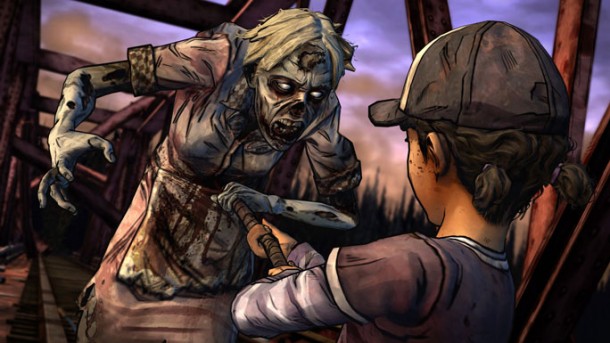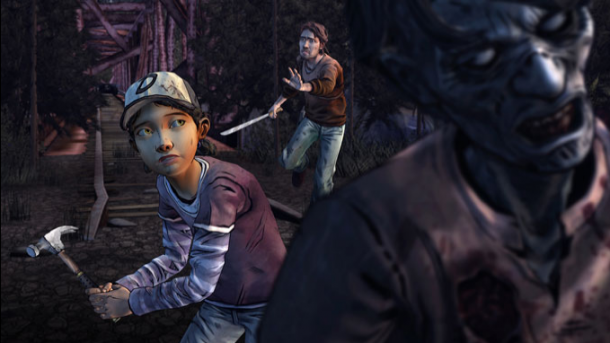Season Two of Telltale Game’s The Walking Dead puts players in the tiny shoes of eleven-year-old Clementine—the same girl that players protected in the game’s critically acclaimed first season. Despite this, the season’s first episode “All That Remains” doesn’t give players a chance to stop and contemplate the uniqueness of Telltale’s protagonist. During the episode, Clementine is held at gun-point, relentlessly pursued through a zombie-infested wilderness, swept away by a river, and adopted by a new cast of survivors that neither player nor character know particularly well.
If The Walking Dead’s second season started explosively, then its second episode—“A House Divided”—is more of a slow burn. This episode dwells more leisurely on the plot threads introduced by its predecessor. Clementine continues to search for her fellow survivors from Season One, and she meets other familiar faces in the process. She finally learns more about Carver, who seems to be the season’s primary antagonist. Here, players have the opportunity to reflect on the changes apparent in both Clementine and her world, even as they’re confronted by a building sense of dread and increasingly difficult choices. The result is a well-balanced and admirably paced episode that holds its own even among the most ambitious of the first season’s episodes.
Many of the first season’s familiar game mechanics return in Episode Two, albeit in sleeker and more organic incarnations. While many choices in Season One had transparent consequences, the choices in “A House Divided” are far more nuanced and far less arbitrary than choosing to save one of two characters. In a stand-off, whom should Clementine tell to hold their fire? In a hostage situation, is it better to meet the demands of the hostage-taker or seek help elsewhere? Choosing poorly can still cost precious lives, but players have a less reliable means of predicting the outcomes of their decisions. This generates a sense of tension—and helplessness—that nicely suits the game’s survival narrative. The game’s “Rewind” feature potentially adds insult to injury by letting players see what might have been if they’d chosen differently. The good news is that the feature allows players to continue their save file from those altered outcomes, giving the meek of heart a way out if they make a bad decision.
“A House Divided” also effectively showcases Telltale’s storytelling chops by drawing attention to the series’ new focus. Whereas the first season followed a group’s desperate struggle for survival in the initial throes of a zombie apocalypse, The Walking Dead’s second season levels its gaze on far more domestic concerns. Episode Two features two groups of characters who have settled down in an attempt to live (rather than simply survive) in spite of the violent world around them. For once, the environment includes nearly as many creature comforts as it does undead; comfy furniture, Christmas decorations, and decks of cards all litter the episode’s main settings. These are survivors gone soft, and their condemning mistakes appear amateurish to the seasoned eye of veteran players. They leave doors unlocked, windows un-boarded. They offer precious food and supplies to strangers. The episode’s early moments may shamble onward at a zombie’s pace, but the carelessness and assumed security of the new survivors create a sense of awful inevitability.
Clementine stands in stark contrast to this cast of characters. Under player guidance, she may act like the grizzled, hardened survivor that she’s become, or she may play up her age in order to avoid dangerous situations. As with the first season, her character development is very much orchestrated by player choices, but, regardless of what they choose, she is often haunted by her past experiences. The inclusion of another young character—fifteen-year-old Sarah—serves as Clementine’s foil and provides the most striking testament of Clementine’s growth between this season and the previous one. It is Clementine who protects Sarah and optionally teaches the older girl to defend herself. When the survivors’ situation spirals out of control, Sarah weeps and clings to her father. Clementine keeps her cool and calls the shots, even among the host of adults that surround her.
This is where the true brilliance of “A House Divided” lies: it serves as Telltale’s irrefutable validation for making Clementine their protagonist. Her youth makes her vulnerable. Her past experiences (and Lee Everett’s tutelage) make her strong. While other characters may be preoccupied with protecting her, Clementine’s gravitas gives her unassailable authority in tough situations, even as she struggles to figure out the best course of action. In a series that capitalizes on throwing players into increasingly worse and uncontrollable scenarios, Clementine is an ideal heroine whose vulnerability and uncertainty often mirror the player’s own emotional responses.
It’s no small task to inspire a crippling sense of dread in gamers while compelling them to keep playing, but this is exactly what Telltale Game’s The Walking Dead manages to do. “A House Divided” provides a new perspective on the aftermath of the zombie outbreak, which keeps the game’s setting fresh and engaging. The episode’s pacing and character development is infectious in its presentation, and it indicates how Telltale is both willing and able to live up to the hype of the series’ prestigious first season. If this latest episode is any indication, both new and old fans alike are set for another season of emotionally impactful and harrowing moments.
This review is based on a retail Steam code sent to SideQuesting by the publisher.





No Comments